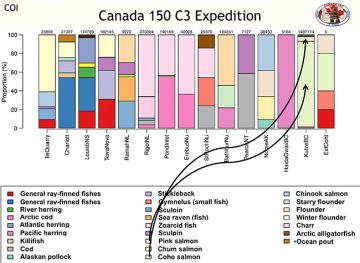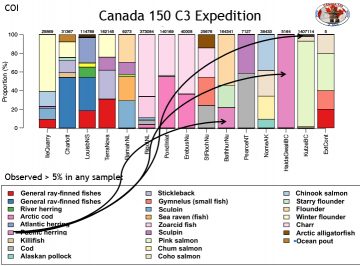There is an old story about a person who doesn’t want to swim in the ocean because “fish go to the bathroom in there.” That is exactly what the researchers of the Trans-Canada eDNA Biodiversity Project are hoping for.
Working with Department of Fisheries and Oceans scientist Dr. Kristi Miller, UBC’s Dr. Brian Hunt, Dr. Curtis Suttle, and Dr. Steven Hallam, have just completed a mammoth 150 day sampling effort around Canada’s coastline, from Toronto to Victoria. Using the Canada C3 expedition as a platform, the team collected water samples from more than 100 locations along Canada’s coasts to examine for trace amounts of DNA shed by organisms into the surrounding environment.
These samples will be specially analysed using next generation genomic sequencing, to detect the presence in Canadian waters of organisms from all walks of life, from viruses to whales. The goal is to build a Pan Canadian biodiversity database that will provide a baseline of species distributions for 2017 against which future changes can be measured. This baseline will help researchers understand the effect of environmental changes, such as ocean warming and pollution, as well as the detection of new invasive species appearing along Canada’s coastlines.
To get a taste of the data a preliminary analysis of fourteen study points has been completed; one at the mouth of the St. Lawrence, five along the Atlantic coast, six in the Arctic, one in Alaska, and three along the BC coast. The results are striking for the level of diversity detail measurable in a simple water sample. Some results are obvious: a great deal of capelin DNA was found in the sample taken in Terra Nova, Newfoundland, while Pink, and Coho salmon DNA was plentiful in the sample from Kutze Inlet, BC – it was taken during the spawning period.
The amount of Pacific herring DNA found in Haida Gwaii was high, but, surprisingly to this west coast based team, so was the amount found in Bathurst Inlet, Nunavat. “I do research on herring on the BC coast, and had not realized that they occur in the Canadian Arctic,” said Dr. Brian Hunt. “This is a good example of the power of eDNA, which we aim to harness to monitor shifts of warm water species into the Arctic.”
In addition to fish, the 16s DNA primers were also able to detect a host of other marine species including sea stars, narwhals and harp seals in northern Labrador, and salmon sharks near Alaska, as well as non-marine species such as moose, black and brown bears, bald eagle, beaver, and even the Pacific newt.

Dr. Brian Hunt
“The eDNA samples enable us to measure the occurrence of species across many taxonomic groups, all from a single sample,” said Hunt. “It would require a huge logistical effort to collect this type of information using traditional observation methods. This is the power of eDNA – making it possible to measure the diversity of life from a simple water sample. As this approach gains traction and the technology improves, the power and accessibility of eDNA is likely to revolutionize marine research.”
Tags: biodiversity, Brian Hunt, Canada, climate change, faculty, fieldwork, fish, marine mammals, ocean ecology, plankton

